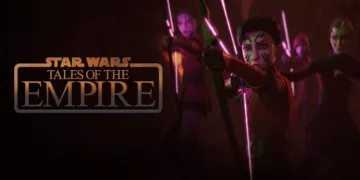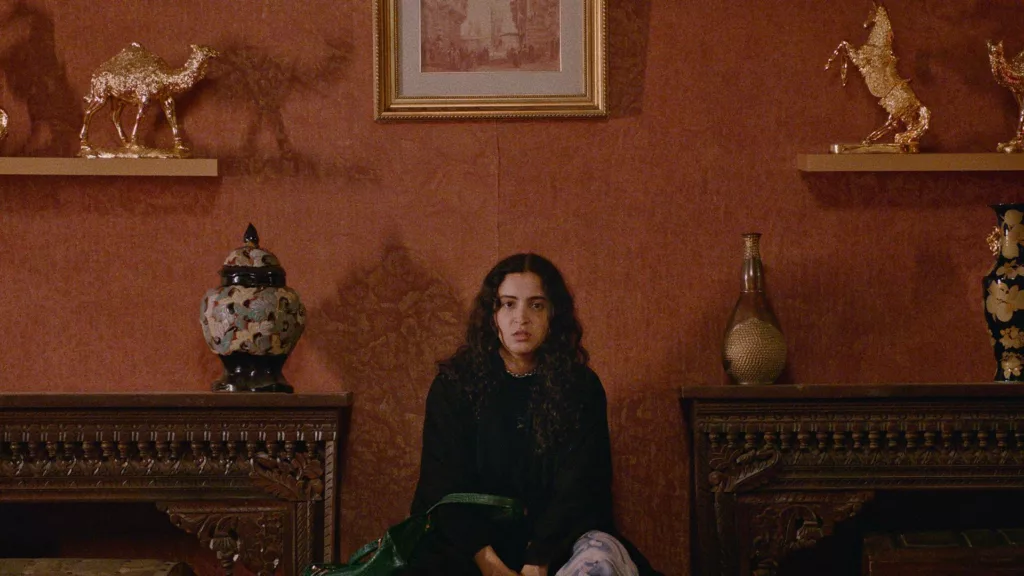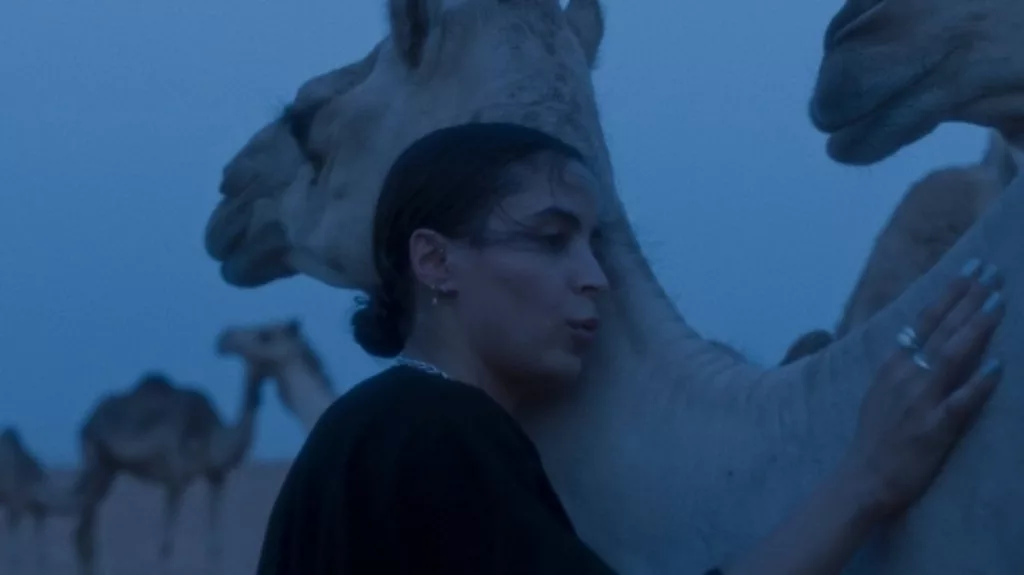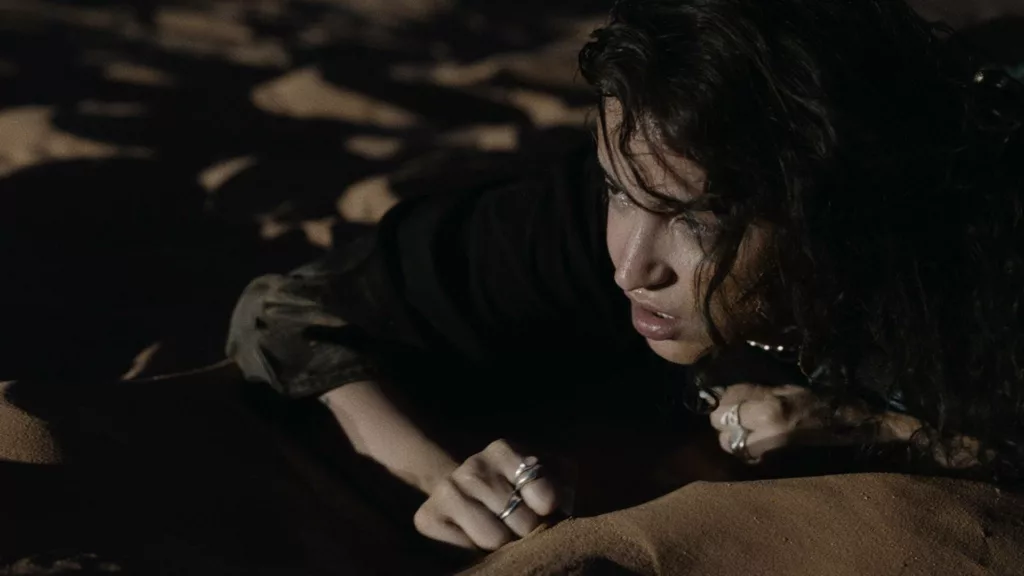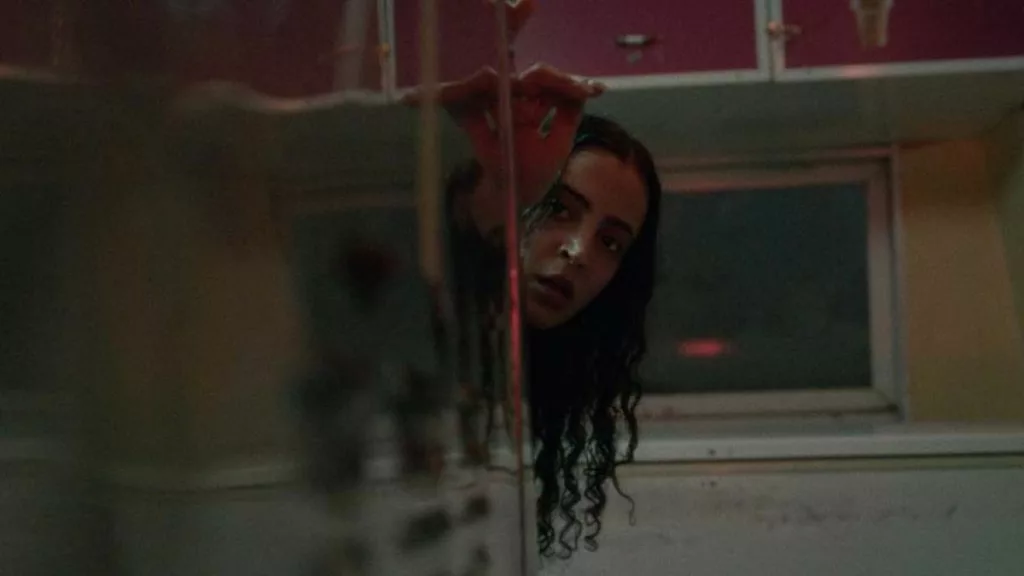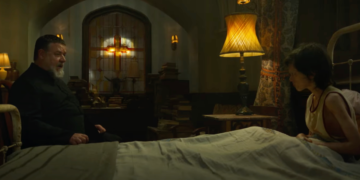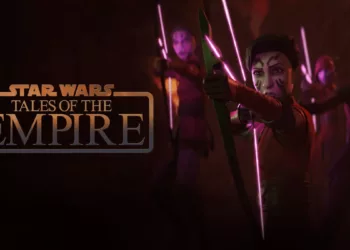You may not have heard of Saudi filmmaker Meshal Aljaser yet, but his directorial debut NAGA is screaming for your attention. This electrifying thrill ride throws us into a day in the life of rebellious young Saudi woman Sarah, who sneaks out for a forbidden rendezvous in the desert. When her ride to a secret party goes horribly wrong, Sarah must battle through a gauntlet of unexpected chaos to make it home before her ruthlessly strict curfew.
Aljaser takes us on a turbulent thrill ride across the Saudi dunes, bringing Sarah’s tense mission to life through seat-gripping action and biting social commentary. Sarah’s fight for freedom reveals the oppressive realities facing Saudi women, while Aljaser’s kinetic camerawork and knack for surprises will leave your head spinning nearly as fast as his frames-per-second.
So strap in for this raucous rebel tale and meet Sarah – a defiant spirit who must wield her wit and will to outrun cultural constraints…and a vengeful camel hot on her heels. Aljaser may be an emerging talent, but NAGA shows he can go tusk-to-tusk with Hollywood’s biggest blockbusters.
A Rebel’s Race Against Oppression’s Clock
Aljaser immediately sets the tone for this high-octane thrill ride with an opening scene of startling violence: In a 1970 Riyadh hospital, a man seeking his wife stalks the halls with a vengeance, murdering her and her doctor in a disturbing exhibition of the danger women face for defying patriarchal rules.
We then crash land into present-day Riyadh, where rebellious Sarah sneaks off for adventure despite the risk of grave consequences if her tyrannical father discovers her disobedience. Aljaser mirrors Sarah’s anxiety through frenetic camerawork barely able to contain the action exploding across the screen. The camera whips and pursues Sarah like a stern paternal gaze, symbolizing the oppressive Saudi society tracking women’s every move.
When Sarah and her boyfriend’s desert date goes haywire, Aljaser shifts into high gear, attacking with an exhilarating barrage of crises as Sarah races a ticking countdown to reach home by curfew. Chaotic camera angles leave us reeling as villains and vigilantes materialize to impede Sarah’s progress. Aljaser ingeniously incorporates horror and thriller genre elements into Sarah’s plight, morphing a vengeful camel into a slasher-flick icon.
Aljaser also brings strokes of dark comedy, from Sarah’s fiery tongue-lashings at the foolish men bumbling into her path to a run-in with her father’s pompously famous poet friend. These humorous beats provide just enough relief so the tension ratchets taut rather than snaps.
The editing dances as frantically as the story, with time flashing back and forth and reality drifting in and out of hallucinatory haze. Aljaser implements a surreal atmosphere and nonlinear narrative to place us directly into Sarah’s rattled mindset. Yet the direction never devolves into complete chaos; Aljaser exerts masterful control over the mayhem, intervening at critical moments to remind us of Sarah’s terrifying stakes with ominous close-ups of her watch.
This ticking clock is no mere thriller Macguffin; it symbolizes a powerful societal force counting down a woman’s chances for freedom. Each obstacle Sarah navigates highlights the brutal injustices and violence Saudi women face for daring to push back against the restrictive hand of patriarchy.
So strap in tight for this urgent, unhinged thrill ride into one daring woman’s break for liberation, directed with the controlled chaos only a true rebel could deliver. Aljaser may be an emerging talent, but NAGA proves he can stand eye-to-eye with Hollywood’s biggest filmmaking renegades.
“Get lost in the suspense with our Head Count review. This debut film combines clever storytelling, a charismatic lead, and a supernatural twist that keeps you guessing until the very end.”
Sarah – Rebellious Spirit Seeking Freedom
At the heart of NAGA’s exhilarating rollercoaster ride lies Sarah, brought to bold life by actress Adwa Bader’s stellar breakout performance. Sarah is no meek or mild-mannered screen heroine; she arrives on scene already lightly smoking and sporting stealthily rebellious plans despite the severe constraints on her freedom.
Bader brilliantly depicts Sarah’s complexity beyond typical “rebel girl” cliches. Yes, Sarah knows how to scornfully flame the foolish men who stumble cluelessly across her warpath. But Bader also unearths glimmers of Sarah’s lingering innocence through moments of vulnerability and wonder amid her desert odyssey.
We understand Sarah’s craving for rebellion because Bader and Aljaser expose the realities caging her – an autocratic father quick to venomous rage if his commands are disobeyed or honor slighted. Sarah mustn’t venture outside without obscuring herself fully within a niqab and chaperone, forcing herself invisible to society’s males though she burns to be seen…and heard. Aljaser highlights the danger awaiting outspoken women by opening his film with the honor killing of a wife and her doctor for the criminal act of being in a delivery room with a male.
So when Bader’s Sarah convinces her cousin to cover for a secret mall outing that’s actually a planned date, we root for Sarah’s success rather than judging her lying. And when boyfriend Saad coaxes Sarah to an underground desert party with hallucinogens and rock music, Bader has us riding shotgun, hungry for Sarah to quench her thirst for long-denied freedom.
Yet Bader allows glimmers of relatable humanity to pierce Sarah’s fierce entitled bravado, reminding us she remains at heart a vulnerable teen. When the party descends into violent chaos, Bader exposes the naked fear behind Sarah’s flinty eyes as she suddenly finds herself isolated and disoriented, abandoned even by the risk-loving rogue she entrusted her fragile hopes to.
As Sarah treks alone across the endless sands, Bader lets her loneliness glimmer through. But she also shows Sarah summoning extraordinary endurance, grit and ferocious wit to battle through her nightmare odyssey. Bader and Aljaser team up to forge Sarah into both everywoman and wonder woman – channeling the suffering, dreams and resilience of every daughter of eve seeking liberation.
Sarah’s Nightmare Odyssey Across Oppression’s Sands
Aljaser launches NAGA by hurling viewers into a hospital hallway swirling with Bright crimson blood as a enraged husband stalks and executes his wife and her doctor for the “dishonor” of allowing a male to deliver his baby. This gut-punch prologue establishes the deadly norms enforcing women’s submission in Saudi society.
We then dash after modern-day renegade Sarah as she revels in minor rebellion’s heady thrill – secretly slipping off her niqab, sneaking off to smoke, lying to rendezvous with a boyfriend. But pretty pleasures soon curdle into slow-dawning nightmare.
Initially, Sarah thrills as she hurtles toward adventure and allure – the forbidden fruit of an underground desert party. But the first bite stings sour when Sarah’s trip becomes tainted by jolting omens – random violence, leering threats, bitter arguments.
Sarah soon washes down the party’s dazzle with hallucinogens, seeking chemical courage as she feels her control slipping away in this den of questionable characters. Then suddenly police raid the bash, inducing pandemonium. Finding herself abandoned and disoriented, Sarah now faces an existential race against time’s oppressive tick as she battles her way across the desert sands in a hallucinatory stupor.
Aljaser ruthlessly assaults Sarah – and the audience – with a sadistic sequence of attacks threatening her quest for freedom as brutally as her society. A devious detour “assisting” Sarah strands her alone with no transportation. Marauding vigilantes torment. Betrayals wound. Piercing reality ruptures confuse her slipping psyche.
Just when it seems things can’t worsen, a wrathful camel arrives to stalk Sarah like a slasher villain, incensed she collided with its herd. In the film’s suspense-soaked showstopper, Sarah slugs it out in alisted death match with the relentless beast. Aljaser channels horror and thriller genre skill to transforming an incensed camel into a ruthless assassin, unleashing full carnage against his heroine. The struggle proves so intensely visceral, so emotionally and physically devastating, it emerges an iconic feat of filmmaking likely to haunt viewers.
Somehow Sarah survives the camel’s onslaught only to awake trapped in new terror – the lightless confinement of a car trunk speeding into the void. Here Aljaser implements plot twists forcing flashbacks to uncover how Sarah landed imprisoned and inching towards death.
By the film’s close, Aljaser has throttled viewers through a white-knuckle gauntlet of anxiety-ratcheting set piecesamplifying the oppression’s crushing effect on Sarah’s soul. Her steely survival instinct emerges as her – and women’s – strongest weapon against brute cruelty. She perseveres through hell by indelibly claiming her heroine’s space within Aljaser’s film and the world, providing a piercing testimony to resistance’s absolute necessity when facing unjust power.
NAGA Bites Back Against Women’s Oppression
Aljaser harnesses the propulsive momentum of an action thriller not just to entertain but also to amplify vital social commentary on the systemic injustices suffered by Saudi women. NAGA serves both as urgent commentary and call to rebellion against crushing patriarchal power.
The film’s high stakes originate from the infantilizing restrictions Saudi society imposes on female behavior. Sarah faces grave consequences for acting independently – even choosing her own clothing – as she remains subject to father, husband, or other male relative as lifelong guardian.
NAGA exposes society’s massive double standard in male and female youth rebellion. Boys like Sarah’s brother enjoy relative freedom to experiment, make mistakes, learn life’s lessons before assuming adult responsibility. Meanwhile, Sarah risks actual death for sneaking one slim slice of the independence and adventure automatically granted her male peers.
Sarah’s curfew clock and the opening honor killing of wife/doctor declare women’s bodies and behavior always vulnerable to male judgment and attack if perceived as rebellious or sexually impure. Sarah’s clothing conveys society’s dehumanization of women, with niqab rendering the wearer faceless and voiceless.
This gender-based oppression system binds women in an unjust psychological prison, breeding understandable resistance. Hence older generation’s rage over modern women’s questioning traditional power structures, challenging assumptions that “protected” status makes up for reduced rights.
Through Sarah’s travails and triumphs, Aljaser exposes oppression’s realities while bringing the dynamic spirit of rebellious women bursting to express their humanity against tremendous odds. We understand why she sneaks, lies, uses false pretexts to claim slight slivers of mobility and choice denied her whole life purely due to being born female.
NAGA delivers its call for women’s uprising not through speeches but visceral experience – throwing us directly into emotional and physical ordeals revealing costs of security without freedom. We emerge deeply feeling Sarah’s resilient soul battling against ingrained cruelty. Her defiance stands for countless Saudi daughters and sisters refusing to allow ballot boxes nor brutality to break their human spirits.
Aljaser Channels Great Renegade Filmmakers
NAGA proudly flaunts the stylistic and tonal influences of various cinematic rulebreakers in Aljaser’s bid to explosively announce himself as an equally bold directing talent.
The film’s relentlessly ticking clock and snowballing disasters evoke the memorable all-night odyssey into chaos of Scorsese’s After Hours. The dizzying camerawork, saturated style and unpredictable see-sawing between absurdist humor and violence channels Tarantino’s flair.
The plot’s high-stakes race against time paired with breathless pace and momentum to spare conjures Tykwers’s landmark Run Lola Run. Aljaser’s kinetic directing style proves equally groundbreaking in its immerssive power.
Meanwhile, central character Sarah’s risky rebellion against oppression for a single night of freedom aligns with the Safdie Brothers’ instant indie classic Good Time. But while the Safdies maintain an underlying gritty realism, Aljaser employs surreal, horror and hallucinatory elements to viscerally convey losing control within an unjust reality.
This willingness to mash up genres and go for emotional blood as well as creative gold cements Aljaser as a daring director eager to forge his own distinctive brand of intensely provocative cinema. NAGA heralds the emergence of a bold new directorial voice announcing itself by pulling no punches.
Buckle Up for This Outlaw Odyssey
NAGA rarely pauses to catch its breath as director Aljaser ruthlessly hurls viewers along with rebellious heroine Sarah through a gauntlet of chaos and catastrophe across the Saudi sands. We emerge gasping but gratified from this relentless high-wire act.
Some may criticize NAGA’s indulgently busy plot or Aljaser’s restless inclination to dazzle with style excess. But the sheer gritty momentum and emotional integrity generated by committed performances and boldly cinematic set pieces capture with striking candor contemporary Saudi social tensions.
NAGA ultimately wins on guts and nerve by refusing to flinch from tough themes. The film captures a society shifting from proudly paternal to restlessly progressive through the eyes of one daring daughter who refuses to have her luminosity dimmed or ambitions muted.
Both in front of and behind the camera, lead actress Bader and director Aljaser announce their stellar arrival as courageous talents breaking rules and blazing trails for new voices. NAGA leaves no doubt these rising stars boast daring creative visions and skill to inspire real-world change.
So thrill seekers craving full-throttle immersion into social issues as human experience rather than headlines should urgently take NAGA for a spin. Aljaser floors the gas while keeping his eyes locked fiercely on the road ahead. So even if the ride gets bumpy in spots, his breakneck rebel spirit wins our hearts as he races full speed towards progress.
The Review
NAGA
NAGA rarely stops to take a breath as it hurtles viewers across Saudi sands for a relentless high-stakes race against time - and oppression. Debut director Meshal Aljaser pits defiant young heroine Sarah against rapidly escalating crises, using propulsive action thriller momentum to drive home the suffocating effects of systemic patriarchy. While the breakneck pace occasionally courts chaos or excess style over depth, Aljaser ultimately keeps firm control over his vision. Meanwhile, lead actress Adwa Bader magnetizes as rule-breaking protagonist Sarah, allowing glimmers of relatable vulnerability and wonder to pierce her fiery arrogance. Their stellar collaboration makes NAGA an astonishingly assured and socially biting calling card for two talents charging towards revolution.
PROS
- Propulsive directing style and kinetic camerawork create an intense, immersive viewing experience
- Powerhouse lead performance by Adwa Bader as the rebellious Sarah
- Socially relevant commentary on oppression of Saudi women
- Clever blending of genres (thriller, horror, dark comedy)
- Daring storytelling choices with nonlinear narrative and surreal elements
- Showcases emerging director Meshal Aljaser as an audacious talent
CONS
- The chaotic plot can feel overstuffed at times
- Moments of stylistic self-indulgence
- Overemphasis on technical flash distracts from story's substance occasionally
- Some secondary characters lack development

